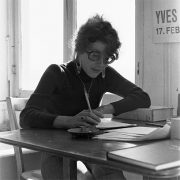Apprenticed to Venus
As Director of CAS I want to tell you why I, who have nurtured so many other memoirs to publication, finally felt free to write my own memoir about my mentor, Anaïs Nin, and why it took me so long to address the subject and begin the book.
What follows is the preface that I wrote for the opening of Apprenticed to Venus published July 11, 2017 by Arcade. It was cut from the final edit of the book for reasons of length. I put it here because I suspect I am not the only diarist to feel repulsed upon reading the outpourings of a younger self.
Preface
Hawaii, 2006
I don’t know how the L.A. Times journalist got my phone number at the remote Hawaii house I co-owned. She had interrupted my prep for a filmmaking class I was teaching that summer for the university in Hilo.
“I’m calling you because Anaïs Nin’s husband Rupert Pole died. I understand that you were Nin’s friend and protégé. You and she wrote The New Diary.”
“No, that’s a mistake on Amazon. I wrote that book. She just wrote the preface.”
“Whatever, you worked together. You were also friends with Rupert, so I was hoping you’d comment…”
I was dumbstruck. Not by news of Rupert’s death (he’d had several strokes) but because it meant – after 42 years – I was finally free from my pledge to Anaïs that I would hide her secrets involving him forever.
“No one can keep a secret forever.” She’d given me a canny smile. “You need only keep silent until Rupert dies.”
Now, some thirty years after her death, Rupert had died. Now this journalist was phoning, now I was the age Anaïs had been when I’d made my vow. Long after the biographers, who never knew her, had unearthed her dirt. Could this young journalist think there was still something worth digging for? I threw her a bone, quickly hung up, and sat in a muddle, unmoving, staring at the surf snaking along the shore.
In the following months, as I drove to U.H. Hilo’s small campus to teach, snippets from my years as Anaïs’ accomplice buzzed and nipped at me. They gave me an itch to look inside my own diaries written between 1962 and ‘76, when Anaïs was my mentor in the realm of the senses.
 When I got back to my home in Los Angeles, I climbed a stepladder to reach the high shelf where my diaries from the ‘60’s and 70’s moldered. I had written those diaries for my older self to read, and now I was my older self. With maturity, though, I’d developed a prudishness that disowned the young woman who had scribbled those journals. As I hoisted down a Hippyish handmade volume with wooden-covers, I dreaded what I’d find. Only a quarter of the way through that fervent diary I had to put it aside, nauseated.
When I got back to my home in Los Angeles, I climbed a stepladder to reach the high shelf where my diaries from the ‘60’s and 70’s moldered. I had written those diaries for my older self to read, and now I was my older self. With maturity, though, I’d developed a prudishness that disowned the young woman who had scribbled those journals. As I hoisted down a Hippyish handmade volume with wooden-covers, I dreaded what I’d find. Only a quarter of the way through that fervent diary I had to put it aside, nauseated.
Yet as the first decade of the 21st Century slid in its downward arc, I realized that I again needed my younger self’s passion and daring, needed to remember a time when material things mattered not at all, needed the hunger and inspiration that comes with exalting a mentor, deserved or not. Entangled as I had been with Anaïs, I would finally have to sort out her influence on my life. For me that meant, now that I could, setting down our intertwined stories: her divine seductiveness, her madcap ruses and countless deceptions, my too willing complicity, and the shared injury of father abandonment that had forged our bond as co-conspirators and seductresses.
So it was that I followed the pliant, fuzzy twine of memory, rather than the diary’s sharp shards, back into Anaïs’ silken web. In reveries, I felt again the touch of her cool fingers and heard the chime of her laughter, as we walked together in late afternoon, our figures, so similar, casting before us as long, Giacometti shadows. Once more, the angled sun in that century past caught the scar along her delicate ear and polished her silvery lids, as she whispered confidences to me, delivered like a kiss.


Beautifully written and very seductive. I can’t wait for the memoir to come out and read the full story.
And to your question about old diaries, I have had that experience, and some of the entries were truly awful. But I have also felt that same aversion to my younger self and her experiences, choices and decisions when I have come to craft and tell oral stories from that time, and I found that it is the story telling process that helps me bring her back into the fold of my life, and accept her, love her and know she was ok. For me it is how I become whole.
I have sent a review of your superb Apprenticed to Venus to Sky Blue Press. If I knew where to send you
a copy, Tristine, I would send to you. A fabulous nouvoir!